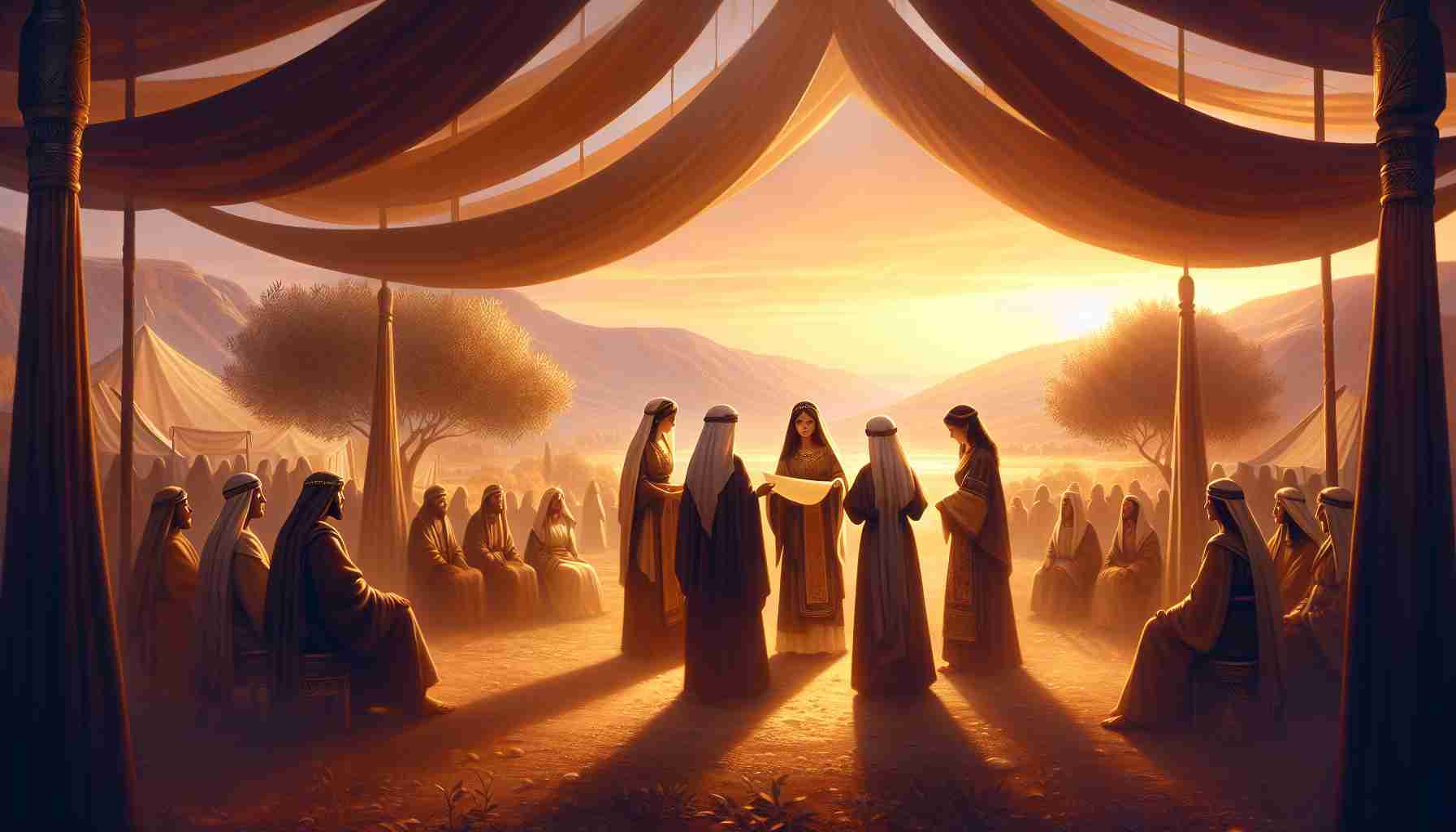

They called me Eliya—just Eliya, a cloth-dyer’s daughter who carried more thread than titles. You won’t find my name in any scroll, but I stood close enough to hear the words that changed everything.
We had just finished weaving that day when a whisper blew through camp like a desert wind: “Mahla and her sisters are going to speak to Moses.”
I froze, the thread slipping from my fingers. Daughters speaking publicly? To Moses—the prophet himself? Women didn’t go before the leaders. They didn’t ask for land. But these were the daughters of Tzelofchad.
Tzelofchad was from the tribe of Manasseh, one of Joseph’s sons, and he died in the wilderness like so many others. He had no sons. That meant his portion of land—the one G-d promised when we entered the land of Canaan—would disappear from his family forever.
But his daughters refused to accept that.
That morning, I followed the crowd to the entrance of the Holy Tent, where Moses judged and G-d’s presence rested. Mahla, Noa, Hoglah, Milcah, and Tirzah stood shoulder to shoulder—not trembling, not whispering—but grounded like oaks.
And then Tirzah spoke.
“Our father died in the wilderness,” she began. Her voice was steady, her eyes fierce. “But he was not among those who rebelled against G-d with Korach.”
She looked straight at Moses. “Why should our father’s name be lost just because he had no sons? Give us a share in the land, just as the sons receive.”
The people around me were silent. Shocked. Some whispered in disapproval. Others, like me, had tears in our eyes.
I wasn’t crying out of sadness—something shifted in me at that moment.
I had always believed G-d’s laws were fixed like the mountains. And maybe they were. But here stood women who loved G-d’s promise so deeply, they wouldn’t let it slip through their fingers—not even when the law said they couldn’t receive it.
Moses didn’t answer right away. He turned and brought their case before G-d.
The next day, Moses gathered the people. I was there again, heart pounding.
“G-d has spoken,” Moses said. “The daughters of Tzelofchad speak rightly. You shall surely give them a heritage among their father's brothers.”
The crowd gasped.
He continued: “And further, if a man dies and has no son, his inheritance shall pass to his daughter.”
I felt a current run through me. It was more than justice—it was blessing. It was a reminder that G-d hears, even when the voice comes from the edge of the tent.
I looked at Mahla and her sisters, and I saw women who had changed the law not by fighting it… but by honoring it with courage.
That day, I walked back holding my head a little higher. I wasn’t part of their family, but it felt like part of the Promise had been restored for all of us—every daughter, every unheard voice.
G-d had seen them.
And in their boldness, I realized… He saw me too.
They called me Eliya—just Eliya, a cloth-dyer’s daughter who carried more thread than titles. You won’t find my name in any scroll, but I stood close enough to hear the words that changed everything.
We had just finished weaving that day when a whisper blew through camp like a desert wind: “Mahla and her sisters are going to speak to Moses.”
I froze, the thread slipping from my fingers. Daughters speaking publicly? To Moses—the prophet himself? Women didn’t go before the leaders. They didn’t ask for land. But these were the daughters of Tzelofchad.
Tzelofchad was from the tribe of Manasseh, one of Joseph’s sons, and he died in the wilderness like so many others. He had no sons. That meant his portion of land—the one G-d promised when we entered the land of Canaan—would disappear from his family forever.
But his daughters refused to accept that.
That morning, I followed the crowd to the entrance of the Holy Tent, where Moses judged and G-d’s presence rested. Mahla, Noa, Hoglah, Milcah, and Tirzah stood shoulder to shoulder—not trembling, not whispering—but grounded like oaks.
And then Tirzah spoke.
“Our father died in the wilderness,” she began. Her voice was steady, her eyes fierce. “But he was not among those who rebelled against G-d with Korach.”
She looked straight at Moses. “Why should our father’s name be lost just because he had no sons? Give us a share in the land, just as the sons receive.”
The people around me were silent. Shocked. Some whispered in disapproval. Others, like me, had tears in our eyes.
I wasn’t crying out of sadness—something shifted in me at that moment.
I had always believed G-d’s laws were fixed like the mountains. And maybe they were. But here stood women who loved G-d’s promise so deeply, they wouldn’t let it slip through their fingers—not even when the law said they couldn’t receive it.
Moses didn’t answer right away. He turned and brought their case before G-d.
The next day, Moses gathered the people. I was there again, heart pounding.
“G-d has spoken,” Moses said. “The daughters of Tzelofchad speak rightly. You shall surely give them a heritage among their father's brothers.”
The crowd gasped.
He continued: “And further, if a man dies and has no son, his inheritance shall pass to his daughter.”
I felt a current run through me. It was more than justice—it was blessing. It was a reminder that G-d hears, even when the voice comes from the edge of the tent.
I looked at Mahla and her sisters, and I saw women who had changed the law not by fighting it… but by honoring it with courage.
That day, I walked back holding my head a little higher. I wasn’t part of their family, but it felt like part of the Promise had been restored for all of us—every daughter, every unheard voice.
G-d had seen them.
And in their boldness, I realized… He saw me too.